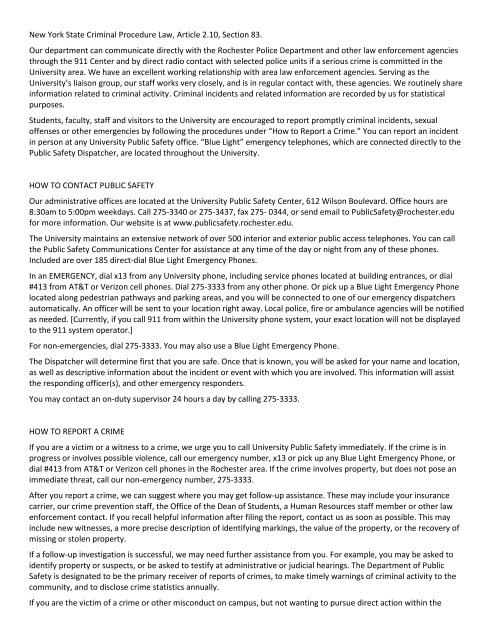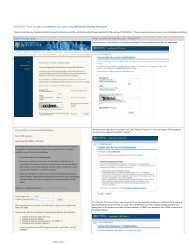mySimon student handbook
You also want an ePaper? Increase the reach of your titles
YUMPU automatically turns print PDFs into web optimized ePapers that Google loves.
New York State Criminal Procedure Law, Article 2.10, Section 83.<br />
Our department can communicate directly with the Rochester Police Department and other law enforcement agencies<br />
through the 911 Center and by direct radio contact with selected police units if a serious crime is committed in the<br />
University area. We have an excellent working relationship with area law enforcement agencies. Serving as the<br />
University’s liaison group, our staff works very closely, and is in regular contact with, these agencies. We routinely share<br />
information related to criminal activity. Criminal incidents and related information are recorded by us for statistical<br />
purposes.<br />
Students, faculty, staff and visitors to the University are encouraged to report promptly criminal incidents, sexual<br />
offenses or other emergencies by following the procedures under “How to Report a Crime.” You can report an incident<br />
in person at any University Public Safety office. “Blue Light” emergency telephones, which are connected directly to the<br />
Public Safety Dispatcher, are located throughout the University.<br />
HOW TO CONTACT PUBLIC SAFETY<br />
Our administrative offices are located at the University Public Safety Center, 612 Wilson Boulevard. Office hours are<br />
8:30am to 5:00pm weekdays. Call 275-3340 or 275-3437, fax 275- 0344, or send email to PublicSafety@rochester.edu<br />
for more information. Our website is at www.publicsafety.rochester.edu.<br />
The University maintains an extensive network of over 500 interior and exterior public access telephones. You can call<br />
the Public Safety Communications Center for assistance at any time of the day or night from any of these phones.<br />
Included are over 185 direct-dial Blue Light Emergency Phones.<br />
In an EMERGENCY, dial x13 from any University phone, including service phones located at building entrances, or dial<br />
#413 from AT&T or Verizon cell phones. Dial 275-3333 from any other phone. Or pick up a Blue Light Emergency Phone<br />
located along pedestrian pathways and parking areas, and you will be connected to one of our emergency dispatchers<br />
automatically. An officer will be sent to your location right away. Local police, fire or ambulance agencies will be notified<br />
as needed. [Currently, if you call 911 from within the University phone system, your exact location will not be displayed<br />
to the 911 system operator.]<br />
For non-emergencies, dial 275-3333. You may also use a Blue Light Emergency Phone.<br />
The Dispatcher will determine first that you are safe. Once that is known, you will be asked for your name and location,<br />
as well as descriptive information about the incident or event with which you are involved. This information will assist<br />
the responding officer(s), and other emergency responders.<br />
You may contact an on-duty supervisor 24 hours a day by calling 275-3333.<br />
HOW TO REPORT A CRIME<br />
If you are a victim or a witness to a crime, we urge you to call University Public Safety immediately. If the crime is in<br />
progress or involves possible violence, call our emergency number, x13 or pick up any Blue Light Emergency Phone, or<br />
dial #413 from AT&T or Verizon cell phones in the Rochester area. If the crime involves property, but does not pose an<br />
immediate threat, call our non-emergency number, 275-3333.<br />
After you report a crime, we can suggest where you may get follow-up assistance. These may include your insurance<br />
carrier, our crime prevention staff, the Office of the Dean of Students, a Human Resources staff member or other law<br />
enforcement contact. If you recall helpful information after filing the report, contact us as soon as possible. This may<br />
include new witnesses, a more precise description of identifying markings, the value of the property, or the recovery of<br />
missing or stolen property.<br />
If a follow-up investigation is successful, we may need further assistance from you. For example, you may be asked to<br />
identify property or suspects, or be asked to testify at administrative or judicial hearings. The Department of Public<br />
Safety is designated to be the primary receiver of reports of crimes, to make timely warnings of criminal activity to the<br />
community, and to disclose crime statistics annually.<br />
If you are the victim of a crime or other misconduct on campus, but not wanting to pursue direct action within the




